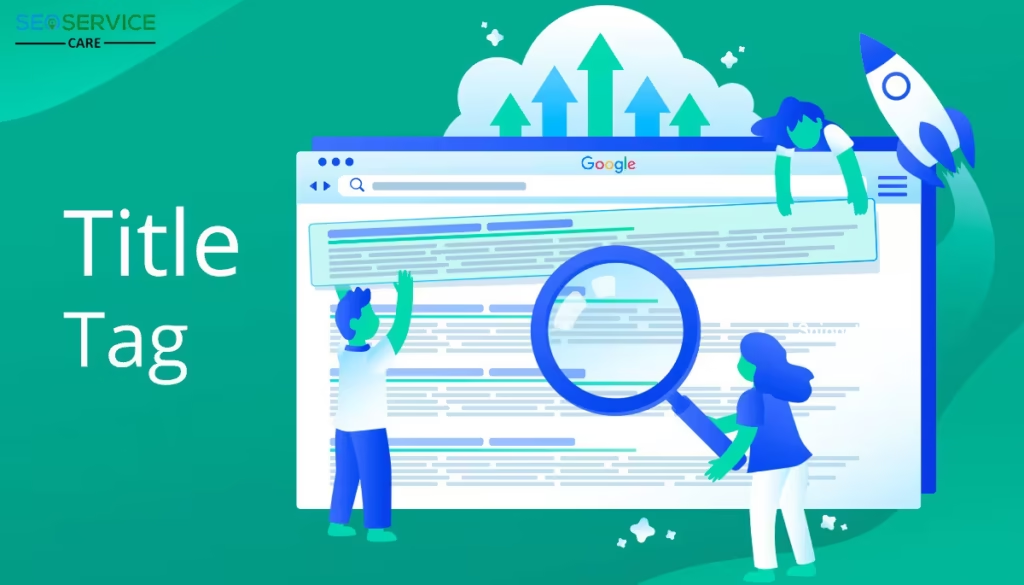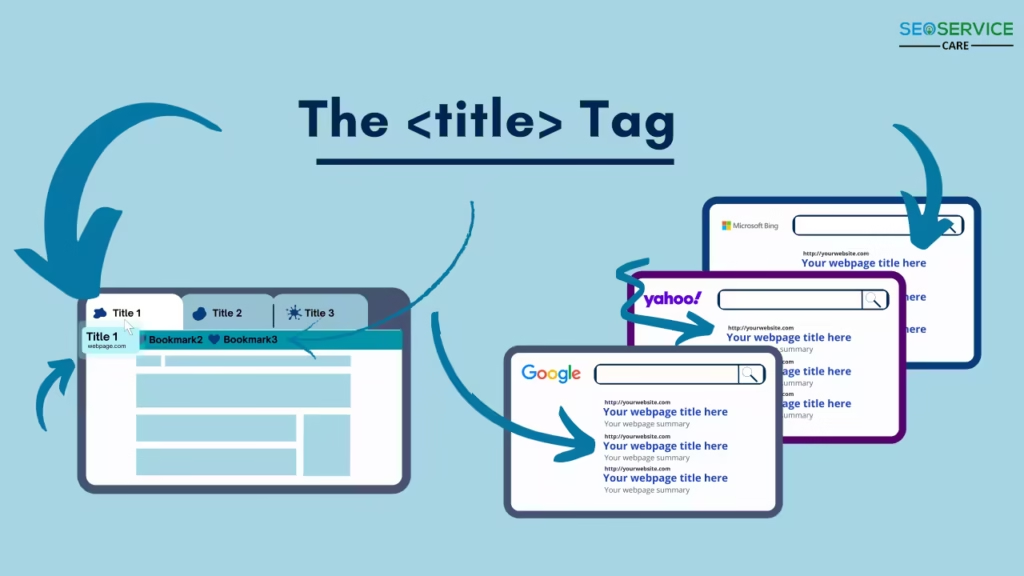What is a title tag?
A title tag is the name of a web page. It is what first reflects in a person’s vision when he is searching for something on the internet; it appears as a blue clickable link that pops out in the search results.
Title tag tells:
What a webpage is all about.
Why one should click on it.
Example:
If you do a search in a browser for “easy cake recipes,” this may pop up:
“5 Easy Cake Recipes – Quick and Delicious!” This is a title tag.

Why is a Title Tag Important?
For People
A title tag is helpful in leading people to decide on visiting or not. When it appears clear and interesting, it will yield more clicks than others.
For Search Engines
Search engines like Google use title tags to understand what your page is about. A good title tag can help your page rank higher.
How Title Tags Help with SEO?
1.Higher Rankings
When you use the right words in your title tag, search engines know what your page is about. This helps them rank your page higher for those words.
2.More Clicks
A catchy title tag gives people the urge to click on your page. In other words, the more clicks your page gets, the better it may rank.
3.Clear Information
A good title tag shows people what is on the page right away. This serves both the person and search engines.
How to Write a Good Title Tag?

1.Use Keywords
Keywords are what people type into a search engine. Use the main keyword in your title tag.
Example: If your page is about pizza, use the word “pizza.”
Good: “Order Fresh Pizza Online – Fast Delivery!”
Bad: “Best Food You’ll Ever Eat” (not clear enough).
2.Keep It Short
Make your title tag short and to the point. Most title tags should be under 60 characters.
For example:
Good: “10 Easy DIY Projects for Kids”
Too Long: “10 Easy and Fun Do-It-Yourself Craft Projects for Kids of All Ages”
3.Make It Interesting
Attention-grabbing. Using action words such as “Learn,” “Buy,” or “Try.”
Example:
Good: “Try These 5 Quick Pasta Recipes!”
Boring: “Pasta Recipes to Cook at Home.”
4.Be Unique
Each page on your website should have a different title tag. This helps search engines know which page to show for each topic.
5. Add Your Brand Name
If you have a well-known brand, include it in your title tag. This builds trust.
For example: “Shop Stylish Shoes | ShoeMart”
6.Avoid Keyword Stuffing
Don’t repeat the same word several times. It’s spammy and will harm your SEO.
For Example,
Bad: “Pizza Pizza Pizza – Best Pizza Online Pizza Order”
Examples of Good Title Tags
For Shopping Sites
- “Buy Affordable Winter Jackets – Free Shipping!”
- “Top 10 Laptops for Students | TechDeals”
For Blogs
- “How to Plant a Garden in Small Spaces”
- “5 Tips to Save Money on Groceries”
For Local Businesses
- “Find the Best Plumber Near You – 24/7 Service”
- “Order Fresh Sushi in Los Angeles – Quick Delivery!”
Common Title Tag Mistakes
1.Too Long
Long title tags get cut off in search results. People won’t see the whole thing.
2. No Keywords
If your title tag doesn’t have keywords, it won’t rank well.
3. Boring Titles
If the title isn’t catchy, people won’t click on it.
4. Duplicate Titles
Using the same title tag on every page confuses search engines.
5. Misleading Titles
If the title does not relate to the content, they will leave your page as quickly as possible.
How to Check Your Title Tags?
1.Look at Your Page
First, open your webpage and the text at the top of the browser tab is actually the title tag.
2. Search for Your Page
Search for your page. The blue link in results is your title tag.
3.Utilize SEO Tools
Tools like Yoast SEO, Google Search Console, and SEMrush will be able to show you your title tags.
Best Practices for Title Tags
- Keep it short and clear.
- Use one or two keywords.
- Make it interesting.
- Avoid using the same title on different pages.
- Update old title tags to keep them fresh.
How Often Should You Update Title Tags?
- Check your title tags every few months. Update them if:
- They are too long.
- They don’t have the right keywords.
- Your page content has changed.
How Title Tags Affect SEO in 2025?
One of the most significant components of SEO includes title tags, which remain crucial. Because search engines are constantly improving and getting smarter. It means you should channel your effort to make your title tags more helpful and clearer.
Frequently Asked Questions: What is a Title Tag, and how does it improve SEO?
1.What is a title tag?
The name or title of a webpage is its title tag. It’s letting people and search engines know what the page is about.
2.Where does a person view a title tag?
- You can see it:
- At the top of your browser.
- As the blue link in search results.
3. How does the title tag help with SEO?
It helps the search engine understand your page and will make people want to click your link.
4. How long should a title tag be?
Keep it under 60 characters.
5. Can I use the same title tag on every page?
No, each page needs a unique title tag.
6. What happens if my title tag is too long?
Search engines cut it off. People won’t see the full title.
7. Should I use keywords in my title tag?
Yes, keywords help your page rank better in search results.
8. With which tools I can check my title tags?
- Use tools like:
- Google Search Console
- Yoast SEO
- Ahrefs or SEMrush
9. Why not stuff keywords in your title tag?
Too many keywords make your title hard to read. It hurts your SEO, too.
10. How often should I update my title tags?
- Check them every few months. If it needs an update, update it.
- Follow these simple rules, and writing creative yet effective title tags will become second nature. A well-optimized title tag can boost your website’s organic traffic and CTR significantly.
Follow the Results:
Continuously monitor the changes in rankings and traffic to see the performance of your newly updated title tags.
- Optimize Other Elements: Title tags work best when combined with other on-page optimizations like improved meta descriptions, well-structured H1 tags, and high-quality page content.
Still feeling uncertain? Consider reaching out to a professional SEO agency for expert guidance. They can help you fine-tune your strategy and ensure all aspects of your on-page SEO are working harmoniously for the best results.






